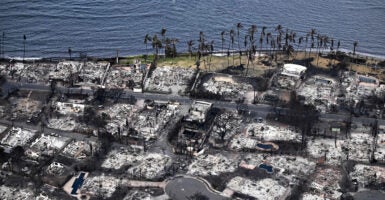As catastrophic wildfires engulf the Hawaiian island of Maui, some media outlets and politicians quickly jumped at the opportunity to blame the disaster on the man-made phenomenon of climate change.
The Associated Press distributed an article quoting Erica Fleishman, director of the Oregon Climate Change Research Institute at Oregon State University, as saying that “climate change in many parts of the world is increasing vegetation dryness, in large part because temperatures are hotter.”
However, not all climate experts agree with this claim reported by the AP for use around the world, and some point out the multitude of factors involved in the natural disaster that began to unfold Wednesday.
Anthony Watts, a senior fellow at The Heartland Institute in Illinois and a meteorologist since 1978, said many factors are at play in the Maui fires that aren’t related to a climate crisis.
Hawaii is one of the most fire-prone states because of its topography, Watts said in a phone interview. Trade winds drop moisture on the east side of the island of Maui, he said, and when air passes over the mountains and down the other side, it dries out and heats up.
Watts noted that fields on Maui used to be rich with sugar cane plantations before Mauians stopped processing the crop and the last such operation closed in 2016. Unattended sugar cane fields were overtaken by dry, easily flammable grass first introduced by settlers in the 1900s.
“So what happened is that we’ve got a combination of native vegetation, which is very flammable and dry, [and] high winds going from east to west,” Watts said.
The official death toll had reached 55 by Friday afternoon, and the mayor of Maui County said that number likely will increase. The wildfires now are 80% contained, according to authorities, but thousands of residents remain displaced without power and communication services.
In the case of Lahaina, a historic town nearly wiped out by fire, “a large area of native grass caught fire and basically blew the fire right into Lahaina,” Watts said. “And there was nothing anyone could have done about it once the fire started. It was just a perfect storm of coincidental factors, as opposed to climate change.”
Jack Spencer, a senior research fellow in The Heritage Foundation’s Center for Energy, Climate, and Environment, agreed with the longtime meteorologist and Heartland Institute researcher. (The Daily Signal is Heritage’s multimedia news organization.)
“Hawaii has been setting itself up for more intense fires for some time,” Spencer said. “For fires to burn, they need fuel, and Hawaii has plenty of it. As it turns out, the decline in agriculture in the state has allowed invasive grasses to take hold in places that were formerly managed for agriculture. “
With mounting evidence that the Maui wildfires aren’t caused by climate change, why do legacy media outlets such as The Associated Press advance this narrative?
“They’re paid to do so,” Watts said, noting that The Associated Press in early 2022 announced receiving a grant of over $1 million “to hire writers specifically to talk about climate change.”
“And to fulfill that mission, he added, “I have seen this again and again and again in The Associated Press.”
“In any event, no matter what it is, they try to find the climate change angle because they’re paid to do so,” Watts, who in 2006 launched the blog Watts Up With That to monitor the issue of global warming or climate change, said of AP.
The Daily Signal sought comment from The Associated Press, which did not respond by publication time.
AP characterized the grant in February 2022 as its largest expansion through philanthropic grants, in this case from climate change activists, allowing the wire service to bring on over two dozen journalists around the world to cover climate.
Since AP received the grant, use of climate buzzwords have increased in the wire service’s stories, according to the Media Research Center.
“The so-called ‘journalism’ AP has been doing on climate involves behaving like the de facto mouthpiece for its major left-wing donors who have an obsession with pushing apocalyptic climate narratives on the internet,” the authors of a study for the conservative organization wrote.
Going forward, Heritage’s Spencer advised, news outlets and consumers shouldn’t dwell on claims that climate change is to blame for the Maui wildfires, but instead on how such a natural disaster could be avoided in the future.
“Rather than falling back on the well-worn trope that all natural disasters are worsened by man-made climate change, we would all be better off focusing on how to help the people of Hawaii to fight the current fires and recover as soon as possible,” Spencer said.
“Then the citizens of Hawaii should take a sober look at all of the factors that could increase the island’s risks and take appropriate action,” he said of Maui.
Have an opinion about this article? To sound off, please email [email protected] and we’ll consider publishing your edited remarks in our regular “We Hear You” feature. Remember to include the URL or headline of the article plus your name and town and/or state.

































One Reply to “Of the Many Factors Behind the Maui Wildfires, Climate Change Was Not One, Experts Say”